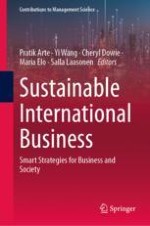This is a unique book that adopts a global approach to studying international business. It stimulates research and rethinking among scholars and practitioners to understand how businesses operate internationally into lucrative markets, and their role in sustainable business growth, glocal value creation, and economic development. It provides insights into how international firms, entrepreneurs, family businesses, and other stakeholders balance the act of value creation and conducting sustainable and ethical business. The book covers economic, social, and environmental dimensions of sustainability such as poverty alleviation through FDI and remittances, diversity and inclusion in management, and ethical governance to value creation for stakeholders and profit maximization through sustainable firm growth, entrepreneurial initiatives, and sustainable business models. It addresses capacity building and the grand challenges that international business needs to develop solutions for. The chapters offer multiple types of contributions including conceptual and theoretical works, literature reviews, and empirical (qualitative and quantitative) studies. The authors, and the topics included, provide a wide international representation and illustrate multi-layered sustainable business perspectives that cover developing, emerging, and developed country contexts as well as multiple directions of international business flows.
